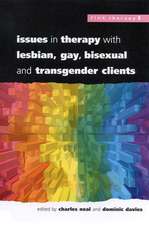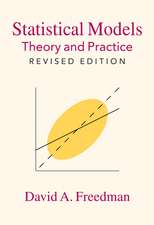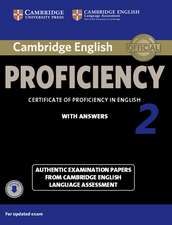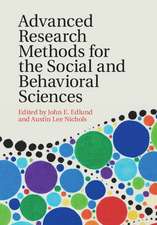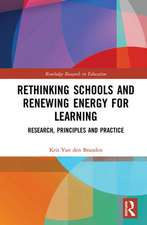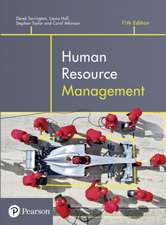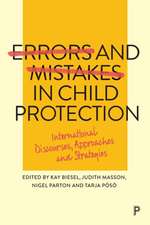How and Why Are Some Therapists Better Than Othe – Understanding Therapist Effects
Autor Louis G. Castonguay, Clara E. Hillen Limba Engleză Hardback – 14 mai 2017
Preț: 514.87 lei
Preț vechi: 635.64 lei
-19% Nou
Puncte Express: 772
Preț estimativ în valută:
98.53€ • 102.49$ • 81.34£
98.53€ • 102.49$ • 81.34£
Carte disponibilă
Livrare economică 24 martie-07 aprilie
Preluare comenzi: 021 569.72.76
Specificații
ISBN-13: 9781433827716
ISBN-10: 1433827719
Pagini: 356
Dimensiuni: 185 x 260 x 25 mm
Greutate: 0.82 kg
Editura: Wiley
ISBN-10: 1433827719
Pagini: 356
Dimensiuni: 185 x 260 x 25 mm
Greutate: 0.82 kg
Editura: Wiley
Cuprins
Contributors
Preface
Introduction
Louis G. Castonguay and Clara E. Hill
Part I: Empirical Foundations
Chapter 1: Therapist Effects, Effective Therapists, and the Law of Variability
Michael Barkham, Wolfgang Lutz, Michael J. Lambert, and David Saxon
Chapter 2: What Characterizes Effective Therapists?
Bruce E. Wampold, Scott A. Baldwin, Martin grosse Holtforth, and Zac E. Imel
Chapter 3: Who Works for Whom and Why? Integrating Therapist Effects Analysis Into Psychotherapy Outcome and Process Research
Michael J. Constantino, James F. Boswell, Alice E. Coyne, David R. Kraus, and Louis G. Castonguay
Part II: Conceptual Contributions
Chapter 4: Appropriate Responsiveness as a Contribution to Therapist Effects
William B. Stiles and Adam O. Horvath
Chapter 5: Therapist Presence, Absence, and Extraordinary Presence
Jeffrey A. Hayes and Maria Vinca
Chapter 6: Inner Experience and the Good Therapist
Charles J. Gelso and Andres E. Perez-Rojas
Chapter 7: The Role of the Therapist's Attachment in the Process and Outcome of Psychotherapy
Bernhard M. Strauss and Katja Petrowski
Chapter 8: The Role of Therapist Skills in Therapist Effectiveness
Timothy Anderson and Clara E. Hill
Chapter 9: The Contributions of Client Culture to Differential Therapist Effectiveness
Jeffrey A. Hayes, Jesse Owen, and Helene A. Nissen-Lie
Chapter 10: Therapist Negative Reactions: How to Transform Toxic Experiences
Abraham W. Wolf, Marvin R. Goldfried, and J. Christopher Muran
Chapter 11: Professional Expertise in Psychotherapy
Franz Caspar
Chapter 12: Gaining Therapeutic Wisdom and Skills From Creative Others (Writers, Actors, Musicians, and Dancers)
Barry A. Farber
Part III: Empirical Contributions
Chapter 13: Effective Therapists in Psychodynamic Therapy for Depression: What Interventions Are Used and How?
Nadia Kuprian, Harold Chui, and Jacques P. Barber
Chapter 14: Effective and Less Effective Therapists for Generalized Anxiety Disorder: Are They Conducting Therapy the Same Way?
Soo Jeong Youn, Henry Xiao, Hanjoo Kim, Louis G. Castonguay, Andrew A. McAleavey, Michelle G. Newman, and Jeremy D. Safran
Chapter 15: Something to Laugh About: Humor as a Characteristic of Effective Therapists
Sarah Knox, Meghan C. Butler, Dakota J. Kaiser, Graham Knowlton, and Clara E. Hill
Part IV: Implications and Conclusions
Chapter 16: The Implications of Therapist Effects for Routine Practice, Policy, and Training
James F. Boswell, David R. Kraus, Michael J. Constantino, Matteo Bugatti, and Louis G. Castonguay
Chapter 17: Therapist Effects: Integration and Conclusions
Clara E. Hill and Louis G. Castonguay
Index
About the Editors
Preface
Introduction
Louis G. Castonguay and Clara E. Hill
Part I: Empirical Foundations
Chapter 1: Therapist Effects, Effective Therapists, and the Law of Variability
Michael Barkham, Wolfgang Lutz, Michael J. Lambert, and David Saxon
Chapter 2: What Characterizes Effective Therapists?
Bruce E. Wampold, Scott A. Baldwin, Martin grosse Holtforth, and Zac E. Imel
Chapter 3: Who Works for Whom and Why? Integrating Therapist Effects Analysis Into Psychotherapy Outcome and Process Research
Michael J. Constantino, James F. Boswell, Alice E. Coyne, David R. Kraus, and Louis G. Castonguay
Part II: Conceptual Contributions
Chapter 4: Appropriate Responsiveness as a Contribution to Therapist Effects
William B. Stiles and Adam O. Horvath
Chapter 5: Therapist Presence, Absence, and Extraordinary Presence
Jeffrey A. Hayes and Maria Vinca
Chapter 6: Inner Experience and the Good Therapist
Charles J. Gelso and Andres E. Perez-Rojas
Chapter 7: The Role of the Therapist's Attachment in the Process and Outcome of Psychotherapy
Bernhard M. Strauss and Katja Petrowski
Chapter 8: The Role of Therapist Skills in Therapist Effectiveness
Timothy Anderson and Clara E. Hill
Chapter 9: The Contributions of Client Culture to Differential Therapist Effectiveness
Jeffrey A. Hayes, Jesse Owen, and Helene A. Nissen-Lie
Chapter 10: Therapist Negative Reactions: How to Transform Toxic Experiences
Abraham W. Wolf, Marvin R. Goldfried, and J. Christopher Muran
Chapter 11: Professional Expertise in Psychotherapy
Franz Caspar
Chapter 12: Gaining Therapeutic Wisdom and Skills From Creative Others (Writers, Actors, Musicians, and Dancers)
Barry A. Farber
Part III: Empirical Contributions
Chapter 13: Effective Therapists in Psychodynamic Therapy for Depression: What Interventions Are Used and How?
Nadia Kuprian, Harold Chui, and Jacques P. Barber
Chapter 14: Effective and Less Effective Therapists for Generalized Anxiety Disorder: Are They Conducting Therapy the Same Way?
Soo Jeong Youn, Henry Xiao, Hanjoo Kim, Louis G. Castonguay, Andrew A. McAleavey, Michelle G. Newman, and Jeremy D. Safran
Chapter 15: Something to Laugh About: Humor as a Characteristic of Effective Therapists
Sarah Knox, Meghan C. Butler, Dakota J. Kaiser, Graham Knowlton, and Clara E. Hill
Part IV: Implications and Conclusions
Chapter 16: The Implications of Therapist Effects for Routine Practice, Policy, and Training
James F. Boswell, David R. Kraus, Michael J. Constantino, Matteo Bugatti, and Louis G. Castonguay
Chapter 17: Therapist Effects: Integration and Conclusions
Clara E. Hill and Louis G. Castonguay
Index
About the Editors

